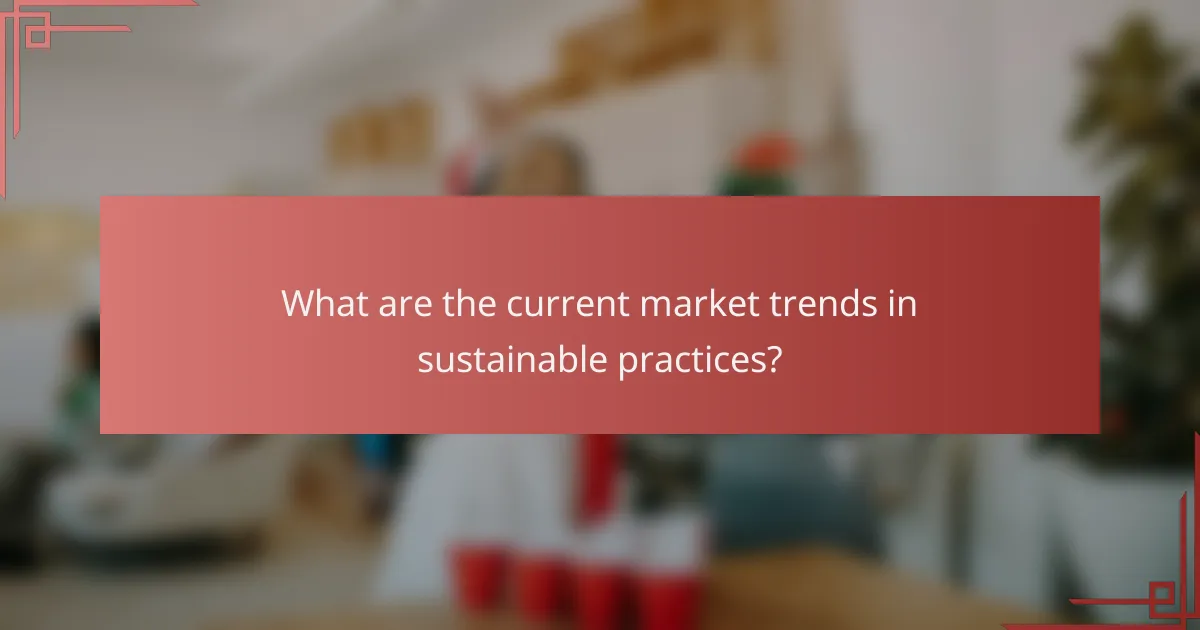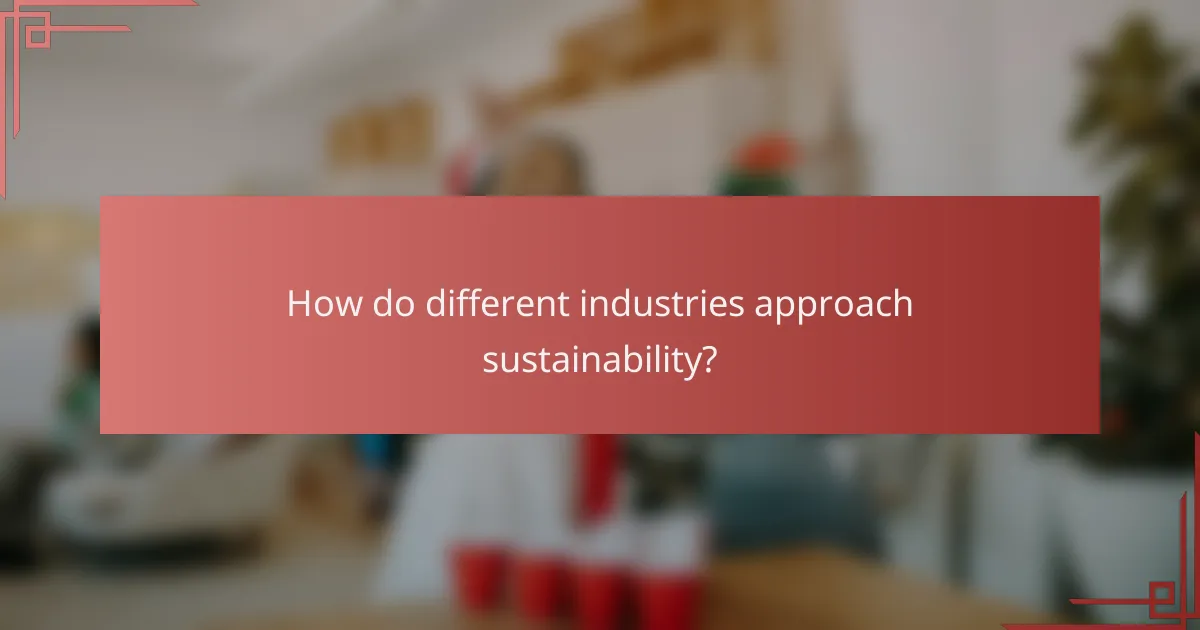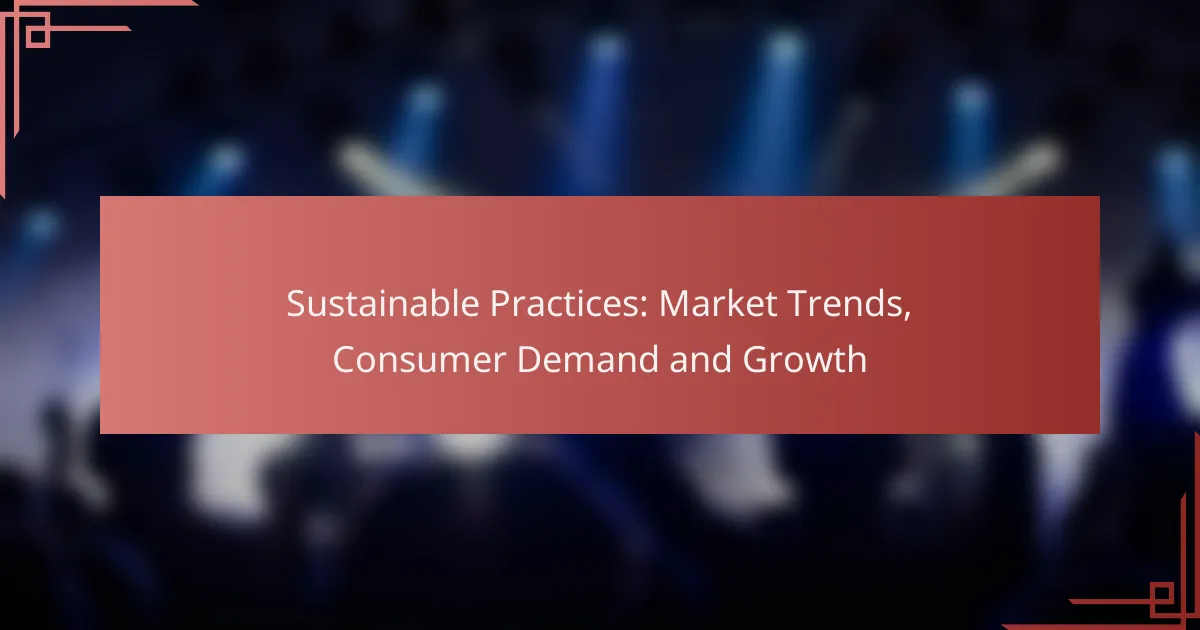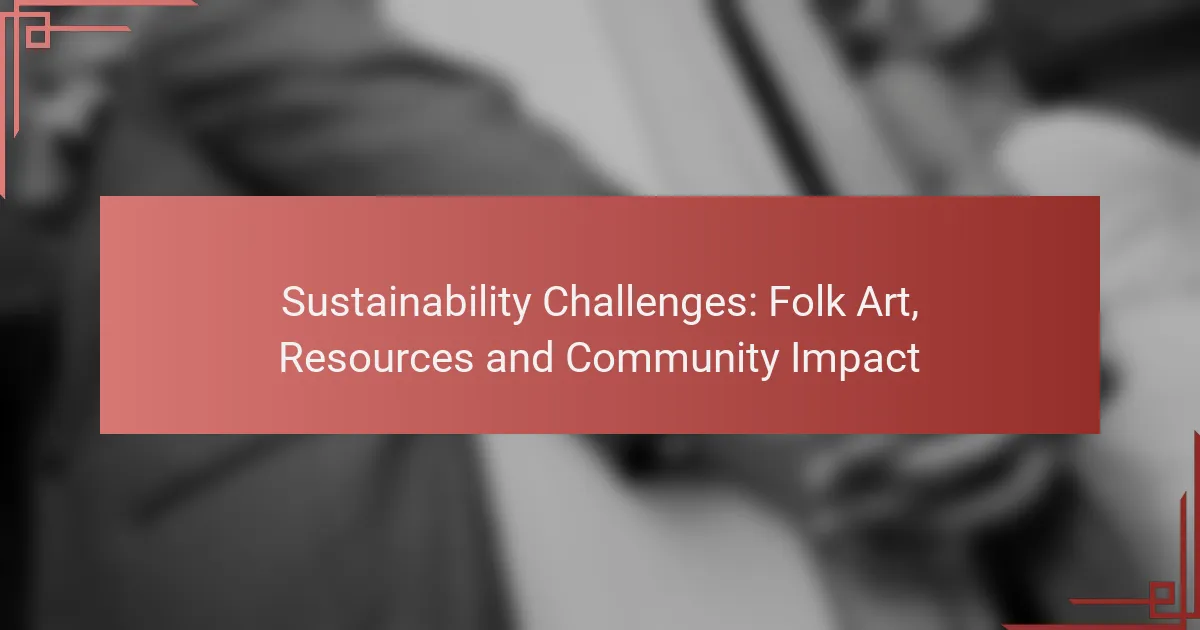The current landscape of sustainable practices reveals a robust shift towards environmentally friendly solutions across multiple sectors, driven by heightened consumer demand. As customers increasingly prioritize sustainability, businesses are adapting their product offerings and corporate strategies to align with eco-friendly values. This transformation is further fueled by government regulations and technological advancements, creating a dynamic market environment that promotes sustainable growth.

What are the current market trends in sustainable practices?
Current market trends in sustainable practices highlight a significant shift towards environmentally friendly solutions across various sectors. This includes increased adoption of renewable energy, a surge in eco-friendly products, and a growing commitment from corporations to sustainability initiatives.
Increase in renewable energy adoption
The adoption of renewable energy sources, such as solar and wind, is rapidly increasing as businesses and consumers seek to reduce their carbon footprints. Many countries are implementing policies and incentives to promote clean energy, leading to a rise in installations and investments.
For instance, in the European Union, renewable energy accounted for nearly 40% of total energy consumption in recent years. This trend is expected to continue as technology improves and costs decrease, making renewable options more accessible.
Growth of eco-friendly products
There is a notable increase in the demand for eco-friendly products, driven by consumer awareness of environmental issues. Shoppers are increasingly opting for items made from sustainable materials, such as biodegradable packaging and organic ingredients.
Brands are responding by expanding their product lines to include greener options. For example, many personal care companies now offer products free from harmful chemicals and packaged in recyclable materials, appealing to environmentally conscious consumers.
Rise of corporate sustainability commitments
Corporations are increasingly committing to sustainability goals, often setting ambitious targets for reducing emissions and waste. Many companies are adopting sustainability as a core value, integrating it into their business strategies.
For example, major retailers are pledging to achieve net-zero emissions by specific target years, often by investing in renewable energy and improving supply chain efficiencies. This commitment not only enhances their brand image but also meets the growing consumer demand for responsible business practices.
Shift towards circular economy models
The shift towards circular economy models emphasizes reducing waste and promoting the continual use of resources. This approach encourages businesses to design products for longevity, repairability, and recyclability.
Companies are exploring ways to implement take-back programs and recycling initiatives, allowing consumers to return products at the end of their life cycle. This not only minimizes waste but also fosters customer loyalty and engagement.
Emergence of green finance initiatives
Green finance initiatives are gaining traction as investors seek to fund projects that have positive environmental impacts. This includes green bonds and sustainable investment funds that prioritize eco-friendly projects.
Financial institutions are increasingly offering products that support renewable energy projects and sustainable infrastructure. For instance, green bonds are being issued to finance solar farms and energy-efficient buildings, aligning financial returns with environmental benefits.

How is consumer demand shaping sustainable practices?
Consumer demand is increasingly driving businesses to adopt sustainable practices as customers prioritize environmental responsibility. This shift influences product offerings, marketing strategies, and corporate policies, compelling companies to align with eco-friendly values.
Increased preference for sustainable brands
More consumers are choosing brands that demonstrate a commitment to sustainability. This preference is evident across various sectors, including fashion, food, and personal care, where eco-friendly products often see higher sales. Brands that prioritize sustainability can differentiate themselves and attract a loyal customer base.
For instance, companies that use organic materials or sustainable manufacturing processes often report increased market share. This trend suggests that aligning brand identity with sustainable values can lead to significant business growth.
Demand for transparency in sourcing
Consumers are increasingly seeking transparency regarding how products are sourced and produced. They want to know the origins of materials, labor practices, and environmental impacts associated with their purchases. Brands that provide clear information about their supply chains can build trust and credibility.
To meet this demand, companies can implement traceability systems and share sustainability reports. This transparency not only enhances consumer confidence but also encourages brands to maintain ethical practices throughout their supply chains.
Growth in eco-conscious purchasing behavior
Eco-conscious purchasing behavior is on the rise, with many consumers willing to pay a premium for sustainable products. This trend is particularly strong among younger generations, who prioritize environmental impact in their buying decisions. Brands that offer eco-friendly options can tap into this growing market segment.
To capitalize on this trend, businesses should consider developing sustainable product lines and marketing them effectively. Highlighting certifications like Fair Trade or organic labels can also attract eco-conscious consumers.
Impact of social media on consumer awareness
Social media plays a crucial role in raising awareness about sustainability issues and influencing consumer behavior. Platforms like Instagram and TikTok allow brands to showcase their sustainable practices and engage with audiences directly. This visibility can significantly enhance brand reputation and consumer loyalty.
Additionally, user-generated content and influencer partnerships can amplify messages about sustainability. Brands should leverage these channels to educate consumers and promote their eco-friendly initiatives, creating a community of like-minded individuals committed to sustainable living.

What are the key factors driving growth in sustainable practices?
The growth in sustainable practices is primarily driven by increasing consumer demand for eco-friendly products, government regulations promoting sustainability, and advancements in technology. These factors collectively create a market environment that encourages businesses to adopt sustainable practices to meet both regulatory requirements and consumer expectations.
Government regulations and incentives
Government regulations play a crucial role in promoting sustainable practices by setting standards that businesses must comply with. For instance, many countries have implemented regulations that limit carbon emissions and promote renewable energy use. Additionally, incentives such as tax breaks or grants for companies that invest in sustainable technologies can significantly influence corporate behavior.
Businesses should stay informed about local regulations and incentives that may affect their operations. Engaging with policymakers can also help companies advocate for favorable conditions that support sustainability initiatives.
Technological advancements in sustainability
Technological advancements are essential for driving sustainable practices, enabling businesses to reduce waste and improve efficiency. Innovations such as renewable energy technologies, waste recycling systems, and energy-efficient manufacturing processes allow companies to minimize their environmental impact.
Investing in technology can yield long-term cost savings and enhance a company’s reputation. For example, adopting solar energy can reduce electricity costs significantly over time, while also appealing to environmentally conscious consumers.
Corporate social responsibility initiatives
Corporate social responsibility (CSR) initiatives are increasingly important for companies aiming to enhance their sustainability efforts. By integrating CSR into their business models, companies can demonstrate their commitment to social and environmental issues, which can improve brand loyalty and customer trust.
Effective CSR initiatives often include community engagement, sustainable sourcing, and transparent reporting on environmental impacts. Companies should ensure that their CSR strategies align with their core values and resonate with their target audience.
Consumer education and awareness campaigns
Consumer education and awareness campaigns are vital for fostering a culture of sustainability. As consumers become more informed about environmental issues, they are more likely to support brands that prioritize sustainable practices. Campaigns that highlight the benefits of eco-friendly products can drive demand and encourage responsible purchasing decisions.
Businesses should invest in marketing strategies that educate consumers about their sustainable practices and the positive impact of their products. This can include social media campaigns, informative packaging, and community workshops that promote sustainability awareness.

What frameworks can businesses use to implement sustainable practices?
Businesses can utilize various frameworks to effectively implement sustainable practices, focusing on transparency, efficiency, and accountability. These frameworks help organizations assess their environmental impact, optimize resource use, and meet consumer demand for sustainability.
Sustainability reporting standards
Sustainability reporting standards provide guidelines for businesses to disclose their environmental, social, and governance (ESG) performance. Common frameworks include the Global Reporting Initiative (GRI) and the Sustainability Accounting Standards Board (SASB), which help companies communicate their sustainability efforts to stakeholders.
When adopting these standards, businesses should ensure their reports are clear, measurable, and aligned with their strategic goals. Regularly updating reports can enhance credibility and foster trust among consumers and investors.
Life cycle assessment methodologies
Life cycle assessment (LCA) methodologies evaluate the environmental impact of a product throughout its entire life cycle, from raw material extraction to disposal. This systematic approach helps businesses identify areas for improvement and reduce their overall carbon footprint.
To implement LCA, companies can use tools like the ISO 14040 series, which provides a framework for conducting assessments. By focusing on key stages such as production, transportation, and end-of-life, businesses can make informed decisions that enhance sustainability.
Green supply chain management
Green supply chain management (GSCM) integrates environmentally friendly practices into supply chain operations. This includes selecting sustainable suppliers, optimizing logistics, and minimizing waste throughout the supply chain process.
Businesses can adopt GSCM by establishing criteria for supplier selection based on sustainability metrics, such as energy efficiency and waste reduction. Regular audits and collaboration with suppliers can further enhance sustainability efforts and drive continuous improvement.

How do different industries approach sustainability?
Different industries adopt unique strategies to enhance sustainability, often driven by consumer demand and regulatory pressures. These approaches vary significantly, reflecting the specific challenges and opportunities within each sector.
Fashion industry’s shift to sustainable materials
The fashion industry is increasingly prioritizing sustainable materials, such as organic cotton, recycled polyester, and Tencel. Brands are responding to consumer demand for eco-friendly options by integrating these materials into their collections, which can reduce environmental impact.
Many companies are also adopting circular fashion principles, encouraging recycling and upcycling to minimize waste. This shift not only meets consumer expectations but can also enhance brand loyalty and market positioning.
Food and beverage sector’s focus on organic sourcing
The food and beverage sector is emphasizing organic sourcing as a key aspect of sustainability. This includes using ingredients that are grown without synthetic pesticides or fertilizers, which appeals to health-conscious consumers.
Many brands are now transparent about their sourcing practices, often highlighting local farms and sustainable agricultural methods. This approach not only supports local economies but also reduces carbon footprints associated with transportation.
Technology industry’s investment in green innovations
The technology industry is investing heavily in green innovations, such as energy-efficient devices and sustainable manufacturing processes. Companies are developing products that consume less energy and have a lower environmental impact throughout their lifecycle.
Additionally, tech firms are exploring renewable energy sources for their operations, aiming to achieve carbon neutrality. This trend not only aligns with consumer values but also positions companies favorably in a competitive market focused on sustainability.



